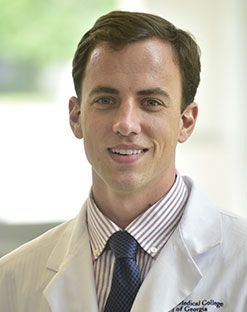Graduate Takes Liberal Arts Route to Med School
 David Sellman ’14 fondly remembers his family practitioner growing up, so much so he looked forward to going to the doctor, even when he wasn’t feeling well.
David Sellman ’14 fondly remembers his family practitioner growing up, so much so he looked forward to going to the doctor, even when he wasn’t feeling well.
“When we got sick,” Sellman said, “we weren’t afraid of going to the doctor because he’d make you feel at home. I decided that’s what I’d like to be and provide for people.”
Sellman has a passion for patient care, but his path to medical school wasn’t traditional. His interests in college included playing cello in the PC orchestra and German philosopher Immanuel Kant’s “Prolegomena.”
Getting into Med School
Sellman, who is in his first year of residency at MUSC, was a philosophy major at PC. His musicianship — he’s played cello since he was 9 — earned him a scholarship.
But what diversified him on his med school application worked to his benefit, he says.
“Interview panels are always interested in why you chose medicine and why you chose a liberal arts education. You’re not the same as 90% of the applicants,” he said. “It sets you apart when you’re applying because you’re not a biology or chemistry major.”
“For the first couple of weeks, students with science backgrounds have an edge, but after that initial adjustment period, that edge fades away,” Sellman continued.
“If you studied philosophy, English or history, that gives you the ability to think critically about the human experience more so than a background in the hard sciences.”
“The entire PC experience contributed to my success”
When it comes to preparedness for medical school, Sellman says there’s no meaningful difference. He believes liberal arts graduates have “more of a broad, humanistic background.”
“The entire PC experience contributed to my success,” he said. “The rigor of the required pre-medical curriculum was an excellent foundation to begin medical school.
“However, the opportunity to explore my interests in the liberal arts and ultimately major in philosophy made me a more diverse and competitive candidate in addition to honing my ability to think critically and express myself effectively.”
Philosophy professors Jim Thompson and Julie Meadows, as well as cello instructor and orchestra conductor, Dr. Richard Thomas, were a large part of that.
“They’d have me over for dinner,” Sellman recalled. “I always felt that they went above and beyond the call of duty to make a personal connection with me and help me achieve my goal during college and after college.They both were deeply committed to my intellectual growth.”
“(Dr. Richard Thomas) went above and beyond the call of duty as well,” he added. “He was interested in my education and what was going on in my life outside of music.”
Becoming a doctor
Sellman plans on becoming a urologist and is doing general surgery this year. Then, he’ll do four years of urology.
“It’s a good specialty, and there’s a lot of demand across the country for urologists. It’s a good blend of medicine and surgery,” he said.
“We treat a lot of issues that are important to people. We have options to be conservative and treat medically, or we have options to be a little bit more aggressive and treat surgically. I like having a lot in my arsenal to offer to patients.”
What do you want to major in?
David majored in philosophy on his way to med school. Check out the majors, minors and other programs that can prepare you for life after college.
